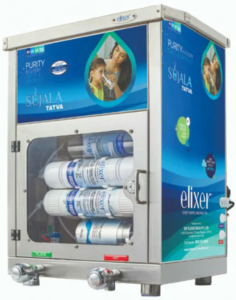Table of Contents
When choosing between an RO or UV water purifier which is better for your needs, it’s essential to understand the strengths and limitations of each technology.
Here’s a breakdown to help you decide:
Reverse Osmosis (RO):
How It Works: RO systems use a semi-permeable membrane to remove contaminants. Water is forced through this membrane under pressure, leaving impurities behind.
Good reads are meant to be shared
Pros:
- Broad Spectrum Filtration: Effective against a wide range of contaminants including heavy metals, salts, bacteria, viruses, and chemicals.
- Removes Total Dissolved Solids (TDS): Ideal for areas with hard or mineral-heavy water.
- Improves Taste: Can remove chlorine taste and odor.
Cons:
- Water Waste: Produces reject water, making it less eco-friendly.
- Slow Flow Rate: Due to the filtration process, water output can be slower.
- Removes Beneficial Minerals: Might require remineralization to restore beneficial minerals.
Ultraviolet (UV) Purification:
How It Works: UV light systems disinfect water by damaging the DNA of microorganisms, preventing them from reproducing or causing disease.
Pros:
- No Chemicals: Uses light, not chemicals, to purify water, maintaining the natural taste and mineral content.
- Fast: Adds no significant delay to water flow.
- Energy Efficient: Operates on relatively low energy compared to boiling or other methods.
Cons:
- Doesn’t Remove Chemicals or Heavy Metals: Only disinfects; physical contaminants, chemicals, or metals remain.
- Requires Clear Water: Effectiveness drops with cloudy or high TDS water, which can block UV light.
- Bulb Replacement: UV bulbs need periodic replacement, typically annually.
Which is Best RO or UV Water Purifier?
- For Comprehensive Filtration: RO is superior if your water has various contaminants, including dissolved solids. It’s especially beneficial in regions with hard water or industrial pollution.
- For Microbial Purification: UV shines in environments where the primary concern is killing bacteria, viruses, or cysts, and the water is already relatively clean from other contaminants.
- Combination Systems: Many modern systems combine both technologies, offering the benefits of RO’s broad filtration with UV’s microbial security, making this often the which is best purifier RO or UV choice for all-around purification.
Which One is Better RO or UV Purifier?
- Location Dependent: In urban areas with treated water but microbial risks, UV might suffice. In rural areas or regions with poor water quality, RO or an RO+UV system might be essential.
- Usage Consideration: For drinking water where taste is a concern, a filtration system with pre-filters might be better to remove taste-altering compounds.
- Maintenance and Cost: RO systems can have higher maintenance costs due to membrane and filter replacements, while UV systems require bulb changes but are otherwise low maintenance.


FAQs:
Q1: Can UV purify water as effectively as RO?
A: For microbial contaminants, yes, but RO tackles a broader range of pollutants.
Q2: Is which is a better water purifier always a straightforward choice?
A: No, it varies based on water quality, health concerns, and environmental impact considerations.
Q3: Do I need both RO and UV in my water purifier?
A: If your water has both microbial and chemical contaminants, a combined system is ideal.
Good reads are meant to be shared




